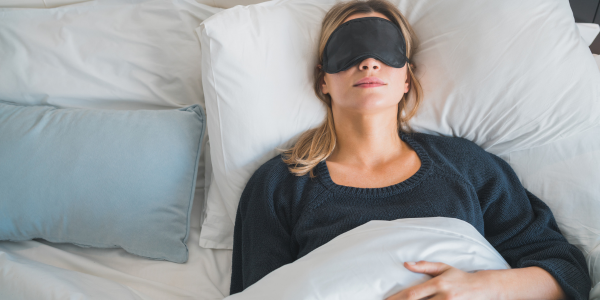
It’s 6 a.m. and your alarm is going off. What do you do? Hit the snooze button, or get up early and work out like you planned?
Before you decide, consider how well you slept last night. While you may want to check exercise off your morning to-do list, feeling well-rested is just as important — if not more so — when it comes to maintaining quality health. This is especially true if you’re going through menopause.
Why Is Sleep Important?
Sleep is essential for our physical and mental health. During periods of rest, our brains reorganize to optimize energy, hormones, and cell repair for the next day. While most health professionals agree that an average of 7 hours sleep is ideal, the amount of sleep you need is personal, and depends on several factors.
Not getting enough rest can cause:
- Anxiety and moodiness
- Increased risk of heart disease and type 2 diabetes
- High blood pressure
- Higher risk of accidents
- Low sex drive
- Trouble concentrating
- Weakened immunity
- Weight gain
On the flip side, getting adequate rest may lead to:
- Easier weight management
- Boosted immune system
- Improved focus and memory
- Stress reduction
Menopause and Sleep: What You Need to Know
Menopause often causes a hormonal imbalance, which can disrupt sleep patterns and contribute to insomnia. Night sweats and hot flashes can make it hard to fall asleep and stay asleep all night. According to a 2017 study, a woman’s risk for obstructive sleep apnea (OSA) and snoring increases by 4% when perimenopause begins.
Tips for Better Sleep
We know it’s not always easy to get a good night’s rest during menopause, so here are some tips to help you out:
- Set a regular bedtime. Establishing a consistent sleep schedule will train your body to expect rest at the same time each day and help you fall asleep faster.
- Avoid caffeine. Don’t consume coffee, tea, chocolate, or other foods with caffeine close to bedtime because it can interfere with your ability to relax.
- Keep your room cool. Hot flashes or night sweats can make sleeping difficult, so try keeping your room cooler (60 to 67 degrees F) for the most comfortable climate at night.
- Invest in quality sheets. Quality sheets can help you get comfortable. They not only keep you cool, but they also feel good against your skin! Silk sheets in particular wick away moisture, keeping your body cooler as you sleep.
- Relax before bed. Listen to music or read a book; try to keep screen time to a minimum. Stressing about not being able to sleep well has a compounding effect, so do gentle, non-active tasks that center around being calm, such as meditating or slow yoga stretches.
How Sleep Support Therapies May Help
If you still have difficulty sleeping, talk to your doctor about therapies like estrogen or progesterone HRT that can help manage menopausal symptoms that disturb sleep.
Belmar Pharmacy provides two sleep support therapies, both of which require a prescription:
- Melatonin: This is a hormone that helps regulate your sleep-wake cycle. A recent study shows that melatonin decreases during menopause. Taking melatonin before bed can help you fall asleep faster and improve sleep quality.
- Modafinil: This medication treats excessive daytime sleepiness caused by narcolepsy or other disorders like OSA. It can help you stay awake during work if your schedule keeps you from having a regular sleep routine.
The next time your alarm goes off in the morning, check in with yourself to see if you’ve had a good night’s rest. If the answer is no, consider focusing on getting quality sleep or relaxing longer in bed instead of immediately jumping into your workout routine. Your body will thank you!
